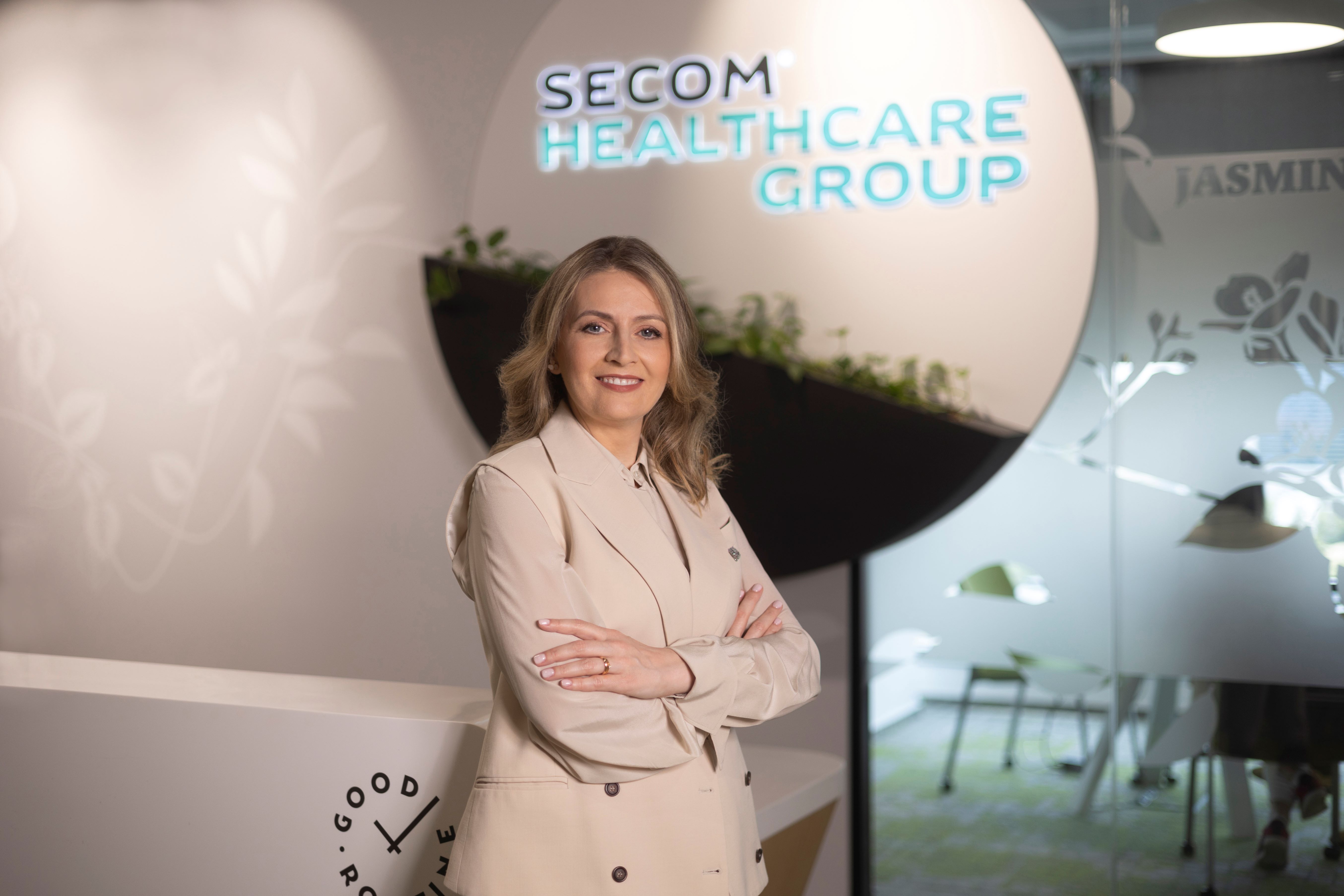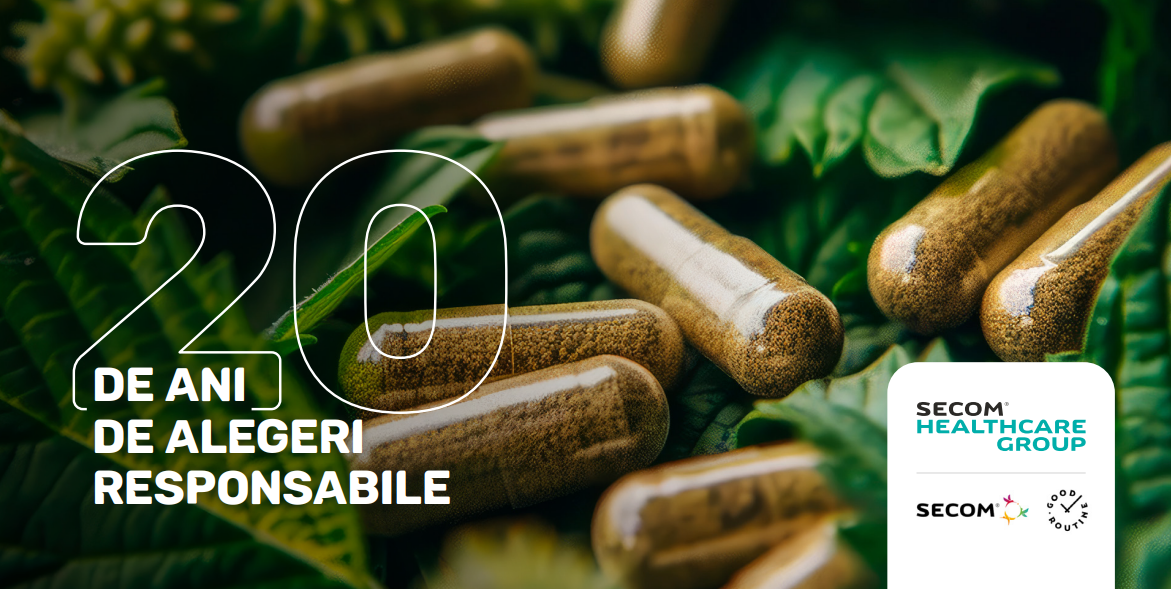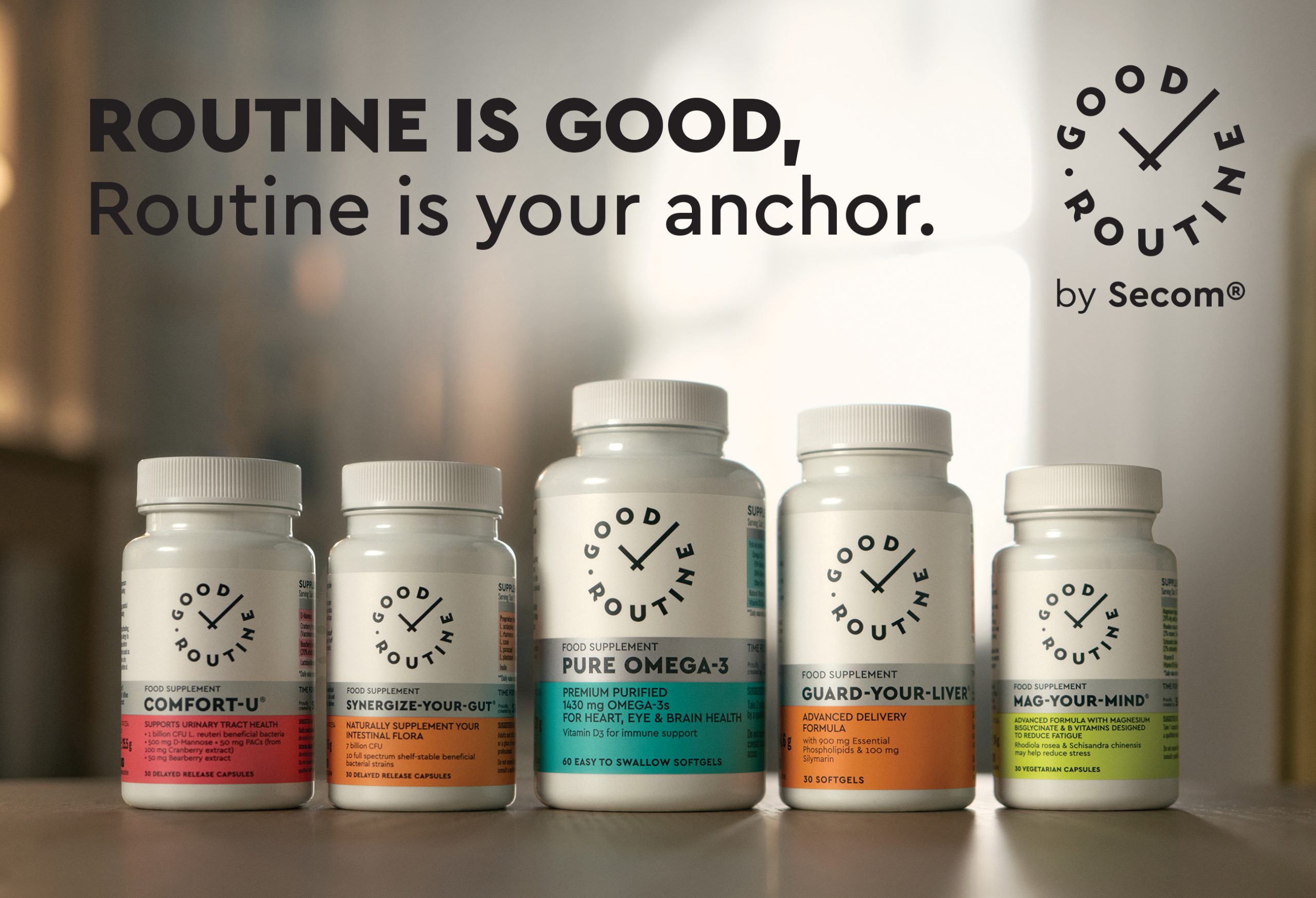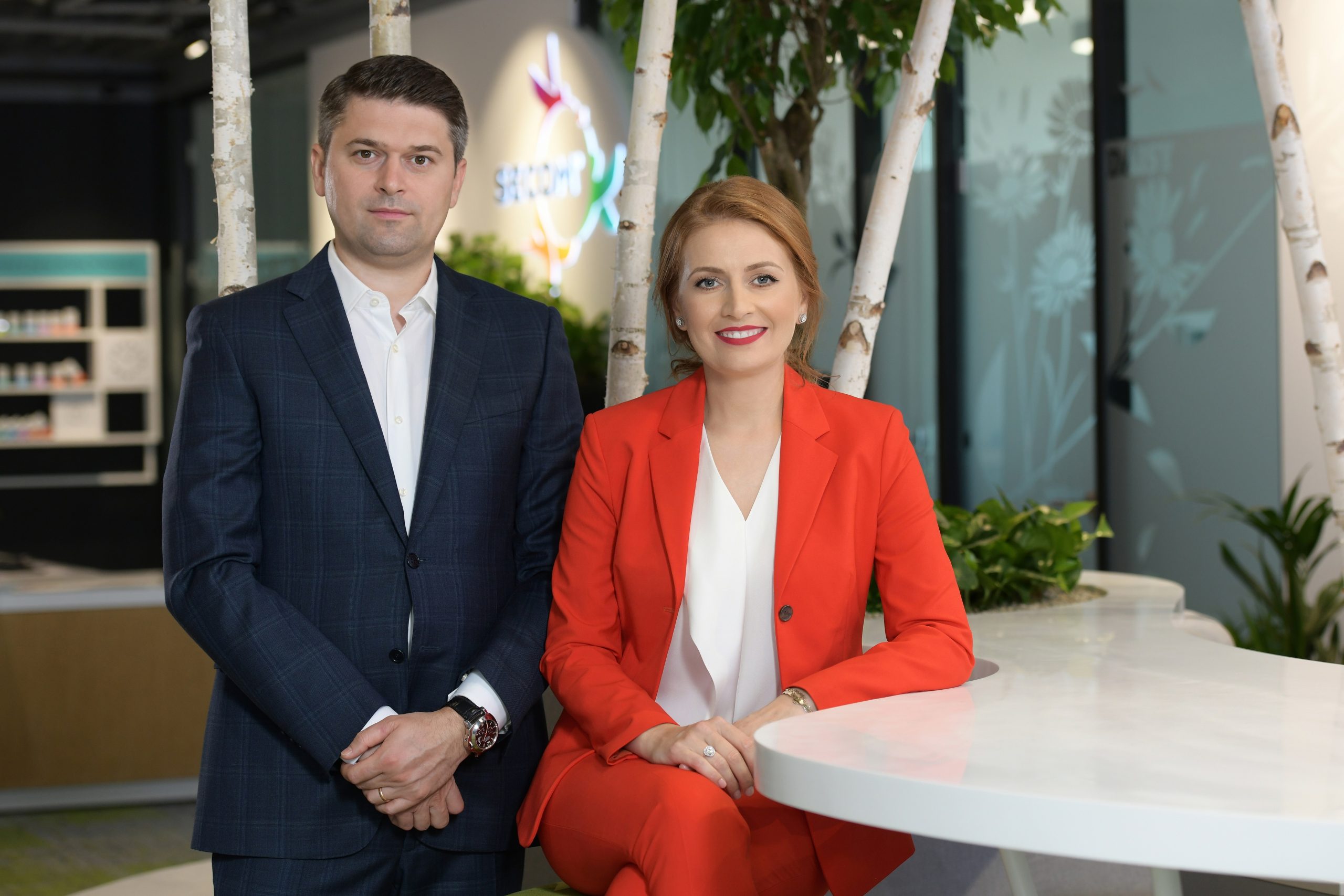Bucharest, May 25, 2025 – Although prevention is gaining more ground in public discourse and individual awareness, it remains insufficiently integrated into the daily behaviors of Romanians: only 17% manage to maintain healthy habits. This is one of the key conclusions of the first edition of the national study “The State of Prevention in Romania”*, […]
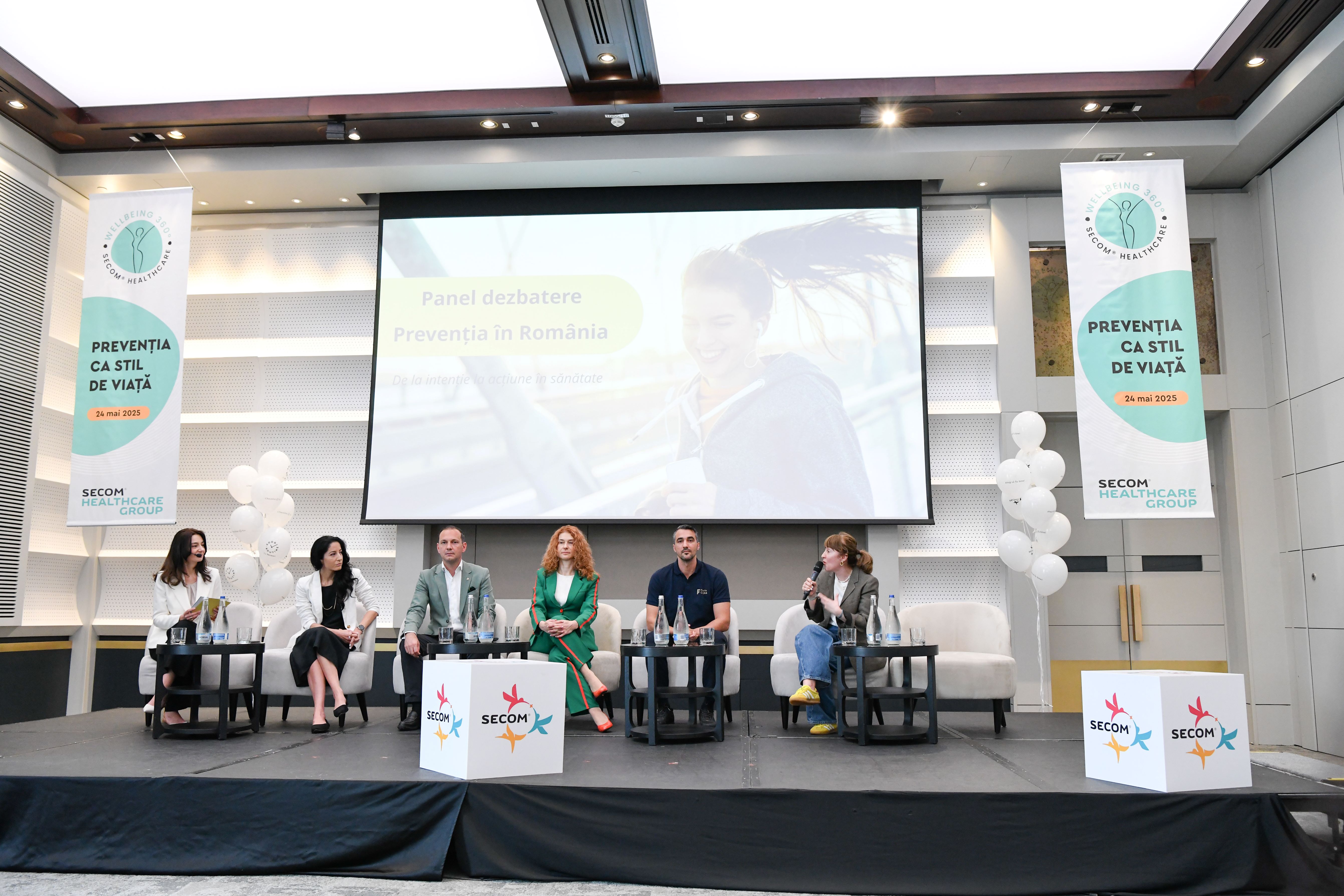
Bucharest, May 25, 2025 – Although prevention is gaining more ground in public discourse and individual awareness, it remains insufficiently integrated into the daily behaviors of Romanians: only 17% manage to maintain healthy habits. This is one of the key conclusions of the first edition of the national study “The State of Prevention in Romania”*, conducted by ISRA Center at the initiative of Secom® Healthcare Group and launched yesterday during the conference “Wellbeing 360˚ – Transforming Prevention into a Lifestyle.”
The initiative aims to provide an annual snapshot of preventive behaviors in urban environments, focusing on the main pillars of a healthy lifestyle: nutrition, physical activity, sleep, emotional balance & stress management, medical check-ups. Secom® commits to a long-term effort to better understand local realities and to encourage involvement from state institutions and other relevant actors in supporting the health of Romanians.
Prevention in Romania: a change underway, but slow
Romanians declared that over the past year they tried to improve lifestyle aspects such as nutrition (60%), hydration (44%), and sleep (44%) – but concrete behaviors remain low among the population, as shown by the data presented below. Also, only 21% reduced or quit vices such as smoking or alcohol consumption, indicating the difficulty of deeper behavioral changes.
Nutrition – between intention and actual behaviors
Although there is declared concern for healthier food choices, only 23% of Romanians consume the WHO-recommended 5 daily portions of fresh fruits and vegetables. Gen Z youth (18–27 years) stand out positively, with an average consumption of 4 portions per day. On the other hand, the lowest consumption is found among those earning under 5,000 lei/month and the Boomer generation – 56–65 years old.
Hydration – a well-established habit
Although the average water consumption in Romania is 1.8 liters/day, below the European Food Safety Authority’s (EFSA) recommendations, about 56% reach or exceed this minimum level, consuming 2 liters or more daily. Men tend to consume more water than women (on average, 1.9L vs. 1.7L), a behavior consistent with official guidelines.
Food supplements – a conscious choice for more Romanians
A positive trend highlighted by the study is the growing interest in dietary supplements. 82% of Romanians have consumed supplements in the last 6 months, and 54% of these did so for preventive purposes. These individuals show a lifestyle profile indicating greater care: they consume more fresh fruits and vegetables, hydrate better, choose healthier snacks, exercise more often, sleep better, are more concerned with stress management, and have had preventive medical check-ups in the last year.
“For over twenty years, at Secom® we have promoted prevention as a lifestyle, both through our portfolio of premium food supplements and through ongoing health education initiatives. Our own brand Good Routine®, created by Secom®, reflects this commitment, built around the principles of prevention and the formation of simple yet effective daily routines as the foundation of a balanced lifestyle. We will continue our mission by expanding our portfolio with science-based solutions and by developing educational projects to help as many people as possible prioritize their health. We also hope that state institutions, alongside other relevant industry actors, will join us in this effort dedicated to the health of Romanians to amplify the impact at the population level,” says Lucia Costea, Co-founder and CEO of Secom® Healthcare Group.
Physical activity – more declared than consistent
47% of Romanians say they exercise at least twice a week, but the average weekly duration is 90 minutes, below the minimum 150 minutes recommended by WHO. Gen Z (18–27 years), people with medium and higher education, parents, and frequent supplement users seem to be more physically active than the rest of the population. Meanwhile, 13% of respondents do not exercise at all. The percentage is higher among those with low education (30%), Boomers (56–65 years, 21%), people with personal income under 3,000 lei/month (19%), and those with chronic conditions (18%).
Sleep duration, borderline for many Romanians
The average reported sleep duration is about 7 hours per night, at the lower limit of the 7–8-hour recommendation by the US National Institutes of Health (NIH), yet 31% of Romanians sleep less than 6.5 hours, an insufficient duration for physical and mental recovery. This is more frequent among Generation X (43–55 years) and Boomers (56–65 years).
Stress – managed mostly through accessible methods
71% of Romanians say they try to manage their stress levels, either occasionally or constantly, with women making greater efforts (78%) than men (63%). Romanians most often turn to accessible stress-reduction strategies, less guided by specialists: walking (19%), music (19%), physical activity (12%), reading/writing (10%), relaxation techniques (10%), meditation (9%), TV/movies (8%), food supplements (7%), breathing exercises (6%), sleep (5%). Worryingly, 12% admit to doing nothing to manage their stress.
Preventive medical check-ups – still uneven behavior
64% of Romanians had a preventive medical check-up in the past year — an important routine for early detection and prevention of non-communicable diseases according to WHO. Boomers (56–65 years) have the highest proportion (80%), who were also diagnosed with chronic conditions, so this is no longer purely preventive behavior. Another concern is that 36% have not checked their health recently — 8% have never had such a check-up, rising to 12% among unemployed individuals, and 28% had their last check-up more than a year ago.
Romanians’ intentions for the future become bolder and more complex
The study shows an increase in intentions not only to improve nutrition (52%), but also physical activity level (47%), weight control (46%), stress management (35%), sleep quality (42%), and reduction of vices (24%). These aspirations reflect growing awareness of the importance of prevention and long-term balance.
Information sources: between online and health professionals
Online sources (websites, forums, social media, AI, etc.) are the main information channel, mentioned by 60% of respondents, but doctors and pharmacists remain trusted by 51%. Online sources are especially preferred by Gen Z (18–27 years), while health professionals are consulted more often by Boomers (56–65 years) and those who declare themselves health-conscious. It is noteworthy that 9% of Romanians use AI-based platforms (e.g., ChatGPT) to get health information — a signal that technology is becoming an increasingly relevant link in managing personal lifestyle.
The results of the “The State of Prevention in Romania” study were detailed during the Wellbeing 360 by Secom® conference, in a dedicated panel alongside experts in physical and emotional health. They also discussed the essential role of food supplements in supporting the five pillars of a healthy lifestyle and offered practical solutions and ideas for healthy routines to integrate prevention into daily life. Below are the main recommendations expressed by the experts during the conference.
Dr. Elena Țambrea – nutritionist, functional medicine specialist:
“Given that data show over two billion people suffer from essential micronutrient deficiencies, prevention becomes a public health priority. Although we have access to more food than ever, modern lifestyle and food quality often cause nutritional gaps with a major impact on the immune system, metabolism, and longevity.
From a functional medicine perspective, I recommend the constant integration of fundamental supplements into the daily routine for preventive health support:
- Vitamin D3, essential for immunity, hormonal balance, and bone health – especially with limited sun exposure.
- Magnesium – preferably in well-absorbed forms like glycinate or citrate – with a role in stress reduction, sleep support, and glucose metabolism regulation.
- Omega-3 fatty acids (EPA and DHA) – with strong anti-inflammatory effects, beneficial in preventing cardiovascular diseases, cognitive decline, and supporting metabolic balance.
Smart supplementation, tailored to individual needs, is a scientifically proven strategy to strengthen real prevention – not just a personal option, but an essential public health direction.”
Professor Radu Țincu, MD, PhD – Senior ICU Physician and Toxicologist: “One of the real public health challenges in Romania is the gap between Romanians’ subjective perception of their health and medical reality. Many consider themselves healthy, although daily behaviors – unbalanced diet, stress, sedentary lifestyle, or chronic toxin exposure – say otherwise. Without awareness and active prevention, this gap risks widening. To support the body’s natural detoxification mechanisms – especially at the liver and intestinal levels – I recommend introducing ingredients with proven roles:
- Silymarin, with antioxidant and liver cell regeneration properties, essential for liver protection;
- Essential phospholipids, which support cell membrane restoration and optimal liver function;
- Probiotics, which maintain intestinal microbiota balance, contribute to intestinal barrier integrity, and indirectly support detoxification.
Real prevention means education, commitment, and constant actions. Detoxification is not an occasional concept but a continuous biological process requiring daily support.”
Florin Cujbă – fitness entrepreneur and physical performance expert:
“When we talk about 360˚ Wellbeing, meaning complete wellbeing, real prevention starts with daily discipline. And constant physical activity is, I believe, one of the most accessible and effective ways to invest in long-term health. Regular physical activity not only reduces cardiovascular risk and regulates metabolism but strongly supports mental health – a key pillar of wellbeing – and actively contributes to a vitality-filled longevity. For this journey towards an active and balanced life to be sustainable and effective, it is crucial to provide the body with the necessary support for recovery and performance. From my experience, I often recommend:
- Hydrolyzed collagen: A trusted partner for joint, tendon, and ligament health. It is essential for preventing injuries and maintaining mobility, supporting an active lifestyle at any age.
- Creatine monohydrate: One of the most studied and validated supplements, excellent for supporting muscle strength, overall physical performance, and optimal recovery. It is also extremely helpful for active individuals over 40.
Remember, movement doesn’t have to be extreme to have a profound impact on our 360˚ Wellbeing. Consistency is key. And the right nutritional support can make the difference between giving up and making steady progress toward a healthier, longer life.”
Dr. Oana Deleanu – primary care pulmonologist, sleep medicine specialist, Lecturer at “Carol Davila” University of Medicine and Pharmacy:
“Sleep is often overlooked in prevention discussions, even though it is a fundamental pillar of physical and mental health. Sleep disorders don’t just reduce quality of life – they increase the risk of cardiovascular, metabolic, and neurodegenerative diseases. Unfortunately, many Romanians do not give sleep the importance it deserves, although real prevention begins with respecting the body’s natural rhythms. In my practice, I recommend supporting restful sleep through a combination of good sleep hygiene and ingredients with proven efficacy:
- Melatonin is useful in circadian rhythm disorders, especially for people with insufficient exposure to natural light, those institutionalized, or postmenopausal women. It has hypnotic and neuro-sedative effects, helping to induce sleep through relaxation, mild drowsiness, and lowering body temperature. It’s also a powerful antioxidant, interacts with the immune system, and helps balance the melatonin–cortisol ratio, which is essential for adapting to stress.
- Passiflora, a plant with mild sedative and anxiolytic effects, can support natural sleep onset without causing dependence.
- Magnesium bisglycinate, with its calming effect on the nervous system, plays a role in inducing relaxation.”
Diana Stănculeanu – psychotherapist, mental health expert:
“A prevention mindset isn’t built through fear or guilt, but through awareness, self-compassion, and the willingness to make small, consistent choices that support inner balance. We need a paradigm shift: stop waiting for a crisis to take care of ourselves and make prevention a daily form of self-care.
For healthy habits to become sustainable, they must be emotionally anchored. It’s important to associate new behaviors – like movement, sleep, or balanced nutrition – with positive emotional rewards, not obligations. When we turn these behaviors into anchored rituals, tied to existing routines (for example, taking supplements with morning coffee, 10 minutes of movement after showering), we increase the chances they will become part of our lives – not just occasional efforts. It’s also essential to cultivate self-compassion: progress in prevention comes not from rigidity but from understanding, patience, and adaptation. We don’t need to be perfect – just consistent. And mental health is the backbone of any long-term, balanced lifestyle.”
* “The State of Prevention in Romania” study was conducted in March 2025 at the initiative of Secom® Healthcare Group by ISRA Center, using the CAWI methodology (computer-assisted web interviews), on a nationally representative urban sample of 1,000 adults (women and men) aged 18 to 65. More details at www.secom.ro/pages/wellbeing-360
About Secom®
Secom® Healthcare Group is a Romanian entrepreneurial company that has become a leading authority in integrative medicine solutions over its 20 years of activity. The company has built a strong reputation for importing and marketing a portfolio of premium health and beauty products. Secom® has the highest retention rate in its category (66%) and is perceived as a quality leader by 43% of professionals in the medical community.
For this reason, Secom® Healthcare Group does not limit itself to being a solutions provider but assumes the role of a health partner, firmly believing that prevention begins with education. Over the years, the company has invested over one million euros in educational projects, such as the "Supliment de bine" podcast, "Planul Bunelor Rutine" – a program that translates neuroscience into practical steps for building healthy habits, the “Health Guide” blog on secom.ro featuring hundreds of informative articles, as well as a series of educational conferences. For more information, visit www.secom-healthcare.com.


